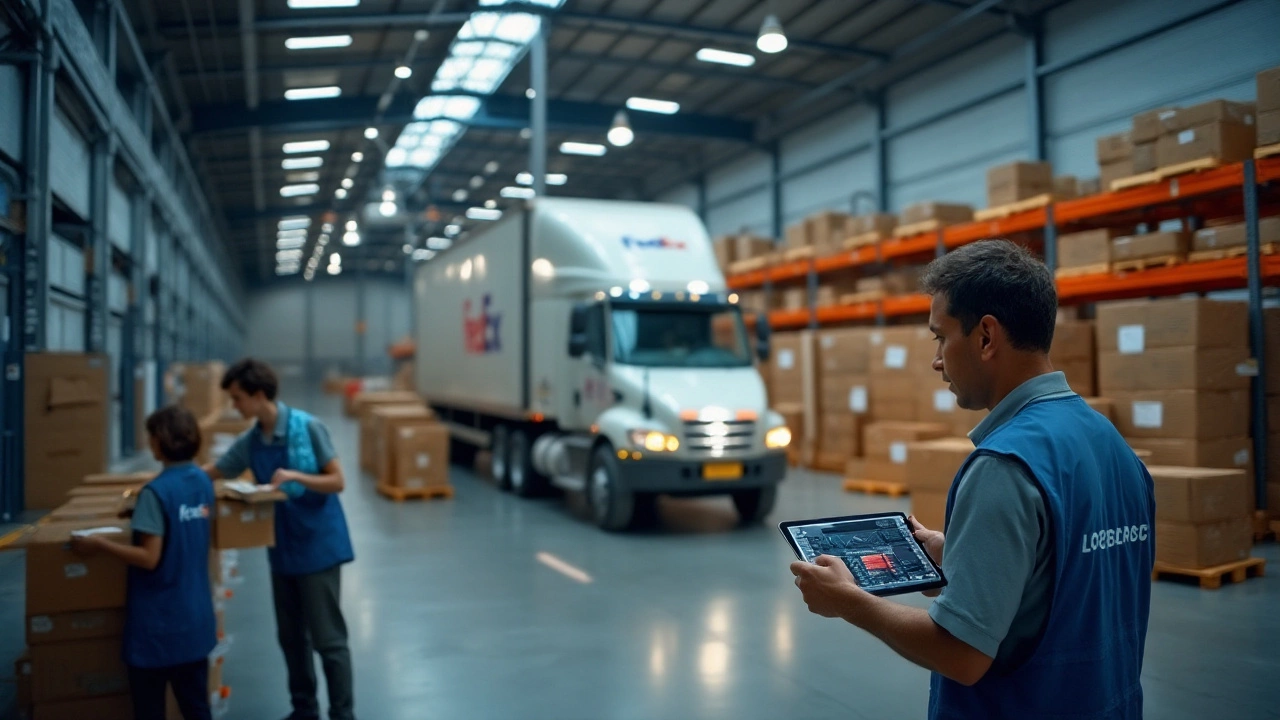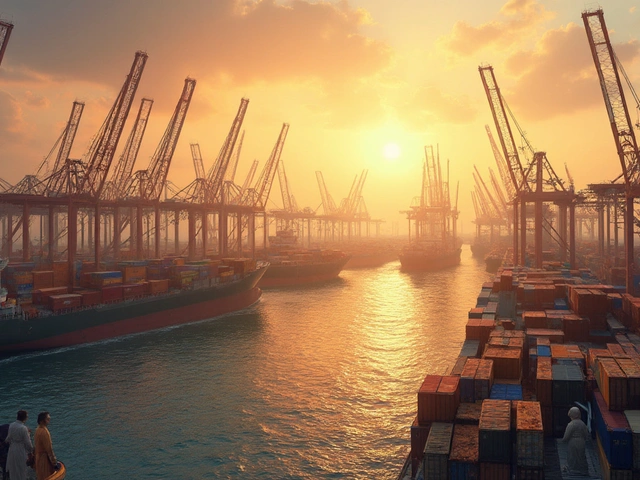In the logistics landscape, understanding the nuances between third-party logistics (3PL) and fourth-party logistics (4PL) is crucial. As business needs evolve, so too does the complexity of managing supply chains efficiently. FedEx stands out as a key player in this field, yet questions abound about where it fits within these logistics categories.
Many companies know FedEx for its reliable package delivery, but its range of services is broader than just getting parcels from point A to point B. This article seeks to explore whether FedEx primarily operates as a 3PL provider, focusing on operational logistics, or if it extends as a 4PL provider, integrating diverse logistics solutions into a unified strategy for its clients.
By examining FedEx's role and offerings, we aim to clarify how it can serve businesses looking to optimize their supply chains. The difference between 3PL and 4PL could significantly impact how a business chooses to structure its logistics partnerships for streamlined operation and growth.
- Defining 3PL and 4PL
- FedEx as a 3PL Provider
- Exploring FedEx’s 4PL Capabilities
- Comparing FedEx’s Offerings
- Choosing the Right Logistics Partner
Defining 3PL and 4PL
When it comes to logistics, understanding the distinctions between 3PL (Third-Party Logistics) and 4PL (Fourth-Party Logistics) is vital for any business aiming to streamline and optimize its supply chain. In essence, both 3PL and 4PL are approaches used to outsource logistics operations. However, they differ significantly in scope, execution, and integration within businesses.
3PL refers to the outsourcing of logistics services, including warehousing, transportation, and sometimes even aspects of the order fulfillment process. Essentially, a 3PL provider handles parts of the logistics processes a company might not manage itself efficiently. Companies save time and focus on core business activities by leveraging a 3PL provider's infrastructure and expertise. For instance, a 3PL can manage your inventory in a warehouse remotely, select carriers, and facilitate the timely delivery of your products. They typically offer technology for tracking shipments and inventory, providing a transparent supply chain operation.
4PL, on the other hand, acts as a logistics integrator, offering a more comprehensive solution. A 4PL provider goes beyond simple service provision, playing a strategic advisory role and often taking over the entire supply chain management for a client. This requires a higher level of control and integration. Not only do they control transportation and warehouse processes, but they also engage in procurement, negotiation of contracts, and strategic planning.
"The goal of a 4PL provider is not just to streamline logistics but to create seamless and efficient supply chain synergy," says supply chain expert Jane Doe from Logistics Today. "Integrating the client’s supply chain processes with skilled leadership and advanced technologies is what differentiates 4PL from 3PL services."
Choosing between 3PL and 4PL services depends on the company's scale, resources, and specific supply chain needs. For companies that need strategic advice and scalable customization with a single interface, a 4PL provider might be the right choice. Yet, for those focused only on specific aspects like distribution and logistics automation, 3PL could suffice. The evolution from 3PL to 4PL represents an expansion from tactical logistics management to strategic supply chain engineering, offering an enticing edge for companies aiming to stay ahead.
Integrating either logistics model into your business requires careful consideration of your existing capabilities, goals, and technological readiness. The right fit can offer a tremendous competitive advantage, as it empowers businesses with the agility to adapt to market changes, thus ensuring sustained growth amidst economic fluctuations. Understanding these differences empowers businesses to make informed decisions, enhancing their logistical efficiency and overall market responsiveness. The strategic partnership formed with either a 3PL or 4PL provider can unlock significant cost savings and operational improvements, essential for thriving in today's fast-paced business environments.
FedEx as a 3PL Provider
FedEx has long been synonymous with reliable and efficient logistics solutions, and its role as a third-party logistics (3PL) provider is a testament to its expansive capabilities in managing and optimizing supply chains. At its core, 3PL involves outsourcing logistics operations such as warehousing, transportation, and distribution. This offers businesses the advantage of focusing on core activities without being bogged down by the intricacies of logistics management. FedEx excels in providing these services with its vast distribution network and cutting-edge technology.
One of the defining features of FedEx as a 3PL provider is its global reach. With facilities and warehouses strategically located worldwide, businesses can tap into FedEx's network to streamline their supply chain processes. This global presence ensures that shipments are handled efficiently, reducing delays and enhancing the customer experience. The advanced tracking systems that FedEx employs also play a crucial role in logistics efficiency, offering real-time updates and improved visibility throughout the delivery process.
FedEx's expertise in transportation logistics is another vital aspect of its 3PL services. It manages an integrated transportation network that includes air, ground, and ocean freight services. This versatility allows businesses to choose the most suitable mode of transportation based on their specific needs, whether it's speed, cost, or a combination of both. The company's investment in technology enhances its transport logistics, optimizing delivery routes and schedules, which can significantly cut down on operational costs.
Moreover, FedEx's extensive service portfolio under its 3PL umbrella also includes specialized solutions. These solutions cater to specific industry demands, such as healthcare and automotive, where logistics services must adhere to stringent standards and regulations. FedEx understands these nuances and tailors its services to meet the unique needs of different sectors. In healthcare, for instance, it offers temperature-controlled logistics for sensitive medical products, ensuring products reach their destination safely and effectively.
In 2019, FedEx made headlines with initiatives focused on sustainability in logistics, underscoring its commitment as a responsible 3PL provider. According to the company's own reports, FedEx has significantly reduced its aircraft emissions intensity by over 40% since 2005. This move towards greener logistics operations not only reflects FedEx's corporate responsibility but also positions it favorably with environmentally-conscious businesses seeking sustainable supply chain solutions.
Leveraging innovative technology is another feather in FedEx's cap. Its Warehouse Management Systems (WMS) and Transportation Management Systems (TMS) are pivotal in optimizing warehouse and transportation operations. These systems provide analytics and insights that help businesses make data-driven decisions, a critical factor in today's competitive landscape. A logistics director once remarked, "FedEx's systems have given us the ability to manage inventory with unprecedented accuracy," emphasizing the impact of technological integration on operational efficiency.

Exploring FedEx’s 4PL Capabilities
As businesses grow and adapt to the ever-changing market demands, understanding the role of logistics partners becomes pivotal. In this regard, FedEx's position as a potential 4PL provider garners significant interest. While FedEx is traditionally seen as a leader in efficient packaging and delivery services, its capabilities extend into the realms of comprehensive logistics management solutions, which characterize fourth-party logistics. A 4PL provider integrates resources, capabilities, and technology to manage supply chain operations. For FedEx, this means not just delivering packages but rather orchestrating the entire logistics network for a client.
FedEx's expansive network affords it the capability to serve as a logistics integrator, which is the quintessential realm of 4PL. This role requires FedEx to align with other freight and transport providers, tech developers, and a customer’s own logistics frameworks to deliver seamless and efficient supply chain solutions. As evidence of this capability, FedEx leverages its vast network of warehouses, freight services, and dedicated logistics operations. By implementing technologies like FedEx Insights, which provides real-time analytics and transparency into supply chains, FedEx steps into the shoes of a 4PL provider effectively.
"FedEx's role in supply chain management is akin to being the maestro in an orchestra, ensuring every component functions harmoniously," remarked a logistics analyst from the renowned John Hopkins School of Business.
The transition from 3PL to 4PL for an organization like FedEx involves adopting a more consultative and strategic approach, which includes optimizing network design, process management, risk management, and innovation implementation across the client's entire logistics pathway. Their ability to provide these services is exemplified in collaborative efforts with leading industries, where FedEx innovates tailor-made logistics solutions that integrate customer needs with technological advancements, enabling flexibility and scalability.
Consider the incorporation of FedEx's Supply Chain Solutions, where FedEx extends beyond just being a service provider to a customer-centric consultant and supply chain architect. This function goes hand-in-hand with their investment in advanced technologies and innovative methodologies that offer clients enhanced control and efficiency. By being engaged at every end of the supply chain continuum, FedEx assists organizations in overcoming logistics hurdles, optimizing costs, and gaining a competitive advantage. This approach not just aligns with 4PL goals but also pushes the boundaries on what customers can expect from logistics services.
A look at industry statistics throws light on FedEx’s proficiency as a 4PL provider. An industry survey reveals that nearly 65% of businesses that partnered with FedEx for integrated logistics solutions reported a significant improvement in efficiency and supply chain visibility, underlying FedEx's effectiveness as a 4PL. With sustained investment into digital logistics management tools, FedEx continues to enhance its capabilities, thereby supporting clients in making data-driven strategic decisions, offering not just services but complete logistics solutions.
Comparing FedEx’s Offerings
Understanding where FedEx stands in the spectrum of logistics solutions is essential for businesses aiming to optimize their supply chains. Traditionally, FedEx has been recognized as a leader in shipping, but delving deeper into its services reveals a multitude of capabilities that go beyond mere package delivery. At the core, FedEx functions as a prominent 3PL provider; it expertly manages logistics operations such as transportation, warehousing, and distribution. These services are performed with remarkable efficiency, leveraging FedEx’s extensive network and technology infrastructure to provide real-time tracking and scheduling, which are invaluable to businesses that rely on precise delivery timelines.
On another front, FedEx has also been expanding its role to incorporate aspects of 4PL services. While it's not a traditional 4PL provider, in some scenarios, FedEx steps into roles that walk this line. This is evident in its FedEx Trade Networks, where it offers comprehensive solutions that include customs brokerage, ocean and air freight forwarding, and trade advisory services. Such offerings highlight FedEx’s capability to control and integrate various logistics functions, suggesting a slight extension into 4PL territories. This level of service can relieve businesses from the logistical burden so they can focus on core competencies, an invaluable asset in today’s fast-paced market.
In discussions about FedEx, the scale and flexibility of its operations often surface as key differentiators. Its global presence allows the company to customize logistics solutions to fit various business models, whether large multinational corporations or local enterprises. The strength of FedEx’s logistics network is such that it’s often viewed as not just moving packages, but as an instrumental part of a broader supply chain management strategy.
FedEx CEO recently mentioned, “As we expand our products and capabilities, we continue to play a vital role in enabling our customers' global success.” This highlights their strategic vision in adapting to market demands.
Comparing its offerings requires examining the innovation in its technology solutions. FedEx’s IT platforms are among the most advanced in the industry, enabling intelligent logistics through tools like FedEx Delivery Manager, which not only enhance user experience but provide critical data analytics that can be used to refine supply chain strategies. For businesses looking at FedEx for potential partnerships, understanding these technological capabilities can be pivotal. Additionally, in embracing sustainability, FedEx has implemented plans to achieve carbon-neutral operations by 2040, setting a precedent in logistics industry practices. Their targets include reducing aircraft emissions and increasing the use of electric vehicles, positioning FedEx not only as a logistics leader but also as a responsible corporate entity.
This balance between traditional logistics and extended supply chain integration services positions FedEx uniquely in the logistics market. While it primarily acts as a robust 3PL provider with expansive resources and technology, its selective immersion into 4PL roles highlights its capacity to manage end-to-end supply chain solutions when necessary. This flexibility ensures that businesses partnering with FedEx can expect customized approaches that meet their specific logistical needs.

Choosing the Right Logistics Partner
Selecting the right logistics partner is a critical decision that can significantly impact your business's efficiency and success. Understanding what your business needs from a logistics provider, whether it's a 3PL or 4PL, is the first step. Starting with a clear definition of these roles is essential. A 3PL focuses on handling logistics activities such as warehousing and transportation. In contrast, a 4PL manages the entire supply chain, offering a more integrated solution that coordinates several different logistics functions under one umbrella. Consider what aspects of logistics you need help with and if you're looking for a service provider or a full supply chain management partner.
Engaging a 3PL like FedEx often means leveraging extensive networks for specific logistics functions. This might include freight shipping, inventory management, and distribution services. These companies work by taking over responsibilities that might be too complex or time-consuming for a business to manage on its own. Deciding whether a 3PL is sufficient for your needs or whether a comprehensive 4PL solution is required depends on the complexity of your supply chain and your internal capabilities. A 4PL takes things further by integrating technology, people, and resources to streamline the entire logistics process and improve upon your in-house strategies.
"Identifying the right logistics partner requires aligning their capabilities with your business goals and logistical challenges," states John D. Smith, a logistics expert.
When evaluating potential logistics partners, consider their experience in your industry. A partner with a proven track record in handling the unique challenges of your sector can offer insights that directly benefit your operations. It's also wise to assess the technology and software they utilize. Advanced logistics software can improve visibility, traceability, and efficiency across the supply chain, all vital components of a competitive business strategy. The software should integrate seamlessly with your existing systems, ensuring smooth operations without unnecessary disruptions or complications.
Another aspect to consider is scalability. As your business grows, so too will your logistics needs. A strong logistics partner should not only be able to handle your current volume but also scale up to accommodate future growth. This is where FedEx's capabilities as a logistics giant come into play, offering flexible solutions that can grow with your needs. Also, when considering scalability, examine the geographical reach of the logistics provider. Companies expanding globally need partners who can operate efficiently across multiple regions with reliable service everywhere they operate.
Key Considerations for Selection
- Experience in Your Industry Sector
- Technology and Software Capabilities
- Scalability and Flexibility
- Geographical Reach and Network Strength
- Pricing Structure and Cost-effectiveness
Pricing and cost-effectiveness are undoubtedly part of the decision-making process. Instead of simply opting for the lowest price, consider the value each logistics partner can provide. Sometimes, investing a bit more can mean a significant boost in service quality, efficiency, and reliability. It's essential to view this partnership as a strategic investment in your business's operational excellence and long-term success.





